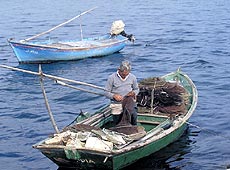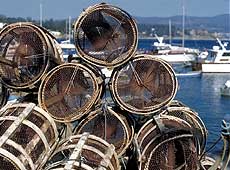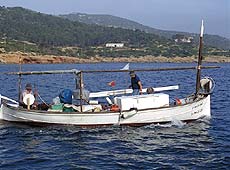|
The Mediterranean Context
The Mediterranean Sea is one of the areas of the world featuring the highest biodiversity, but at the same time demonstrating poor productivity. The Mediterranean fisheries are extremely diverse, targeting a great number of species, and have an extensive scope of fishing gear and methods, some of them unique. Catches are highly multi-specific. Fishing in the Mediterranean is a major economic activity, in terms of jobs, revenues and food supply. Fishing products are an important component of the Mediterranean diet, and fishery has been one of the pillars of the Mediterranean civilization and culture.

Industrial fisheries have been strongly developed for half a century, but have never reached the same importance as in the oceans. Fishery in the Mediterranean is an artisan sector in which a large number of small boats are used. However, the increase in demand, joined to the increase in population and the development of markets, have led to a generalized over-fishing trend in the region. Moreover, fishing in the Mediterranean is organized on the basis of bilateral agreements; there is no exclusive economic fishing zone. In addition to over-fishing, the industry faces other problems, such as poor knowledge of the biology of juvenile stages and of fish migration patterns; insufficient quality of Mediterranean fish statistics; and lack of integration between fishery biologists and fishery managers, with little connection between catch effort and population dynamics.

Aquaculture is a possible alternative way to produce fish in the region, though it is far from reaching its objectives, and still lags behind expectations. At the same time, the issue must be raised of how to integrate this activity with others such as tourism, and to reduce its impact on the environment.

What is the centre doing on fisheries? The main activities are around two ideas:
- Sustainable fisheries - Ecosystem approach
- Aquaculture - Environment
|
|
Sustainable
fisheries - Ecosystem
approach
The Ecosystem approach to fisheries (EAF) is one of the most important concepts recently to emerge with regards to a comprehensive management of the fisheries sector within the goal of a sustainable use of marine resources. The purpose of an ecosystem approach to fisheries is to plan, develop and manage fisheries in a manner that addresses the multiple needs and desires of societies, without jeopardizing the options for future generations to benefit from the full ranges of goods and services provided by marine ecosystems. The definition of an EAF can consequently be ascertained:
An ecosystem approach to fisheries strives to balance diverse societal objective, by taking into account the knowledge and uncertainties about biotic, abiotic and human components of ecosystems and their interactions and applying an integrated approach to fisheries within ecologically meaningful boundaries.
(FAO Fisheries Department. The ecosystem approach to fisheries, FAO Technical Guidelines for responsible fisheries, No.4, suppl.2.Rome, FAO. 2003)
Mediterranean fisheries are quite peculiar. They have a long history and their own logic. Most of them are traditional even though industrial fisheries also operate. The most important characteristic of the Mediterranean fisheries is that they are multi-specific. The concept of an ecosystem approach to fisheries has to be studied within the framework of the Mediterranean fisheries in order to identify its specificity. The Centre for Mediterranean Cooperation aims to identify possibilities in the region, so as to apply the concept of an Ecosystem approach to fisheries.
In relation to this topic, IUCN-Med is working in close cooperation with the Fisheries Working Group of the European Sustainable Use Specialist Group of the Species Survival Commission, and with the EBCD (European Bureau for Conservation and Development), an NGO member of IUCN, based in Brussels. During recent meetings of this group, in March and October 2004 in Brussels and Copenhagen respectively, workshops have been held to define a project concerning implementation of the ecosystem approach concept in the Mediterranean region. It has been decided to begin this work by identifying best practices of local fisheries management which take into consideration the ecosystem as a whole.
Related Documents:
|
|
|
| Aquaculture in the Mediterranean
Aquaculture is expanding quickly in several Mediterranean countries. In many cases, implantation occurs in shallower areas for practical reasons. However, it has been noted that many environmental problems may arise if the site is not adequately chosen. The impact can be very important both for the ecosystems and even production itself. In fact, breeding organisms need good water quality in order to grow in good condition. The selection of the site is therefore highly important. In several countries, environmental impact procedures are compulsory, and are sometimes so complex that only companies can get established in them.
The aim of this project is to highlight the real problems that aquaculture can cause to the environment, and to find possible solutions in order to allow its development in a sustainable way, that is without a negative impact on the environment, whilst allowing fair access to it. Regarding this topic, IUCN-Med is working in close cooperation with the Federation of European Aquaculture Producers (FEAP), based in Brussels.
IUCN-Med is also working in collaboration with a group of specialists in Asia, including the Network of Aquaculture Centers of Asia (NACA) and the regional office of the Food and Agriculture Organization (FAO) in Bangkok. The purpose of this collaboration is to identify criteria and indicators for aquaculture's sustainable development. At regional level, IUCN-Med is organizing a first meeting in 2005, in Algeria, in order to assist Algeria in the sustainable development of aquaculture.
Related Documents: From Strategy to Reality: Developing European Aquaculture. François Simard. Athens, May 29-30, 2003
Planning and Management for sustainable coastal aquaculture. Joint Group of Experts on the Scientific Aspects of Marine Environmental Protection (GESAMP). 2001.
Aquaculture planning in Mediterranean countries = Planification de l'aquaculture dans les pays méditerranéens. Zaragoza. CIHEAM-IAMZ, 1999. 188 p. (Cahiers Options Méditerranéennes; v. 43). Workshop of the CIHEAM Network on Socio-economic and Legal Aspects of Aquaculture in the Mediterranean (SELAM), 1998/03/12-14, Tangiers (Morocco) Mediterranean aquaculture:marine fish farming. By Bernardo BASURCO.
For
further information, please
contact
François Simard.
|
|
| |
|
|
|